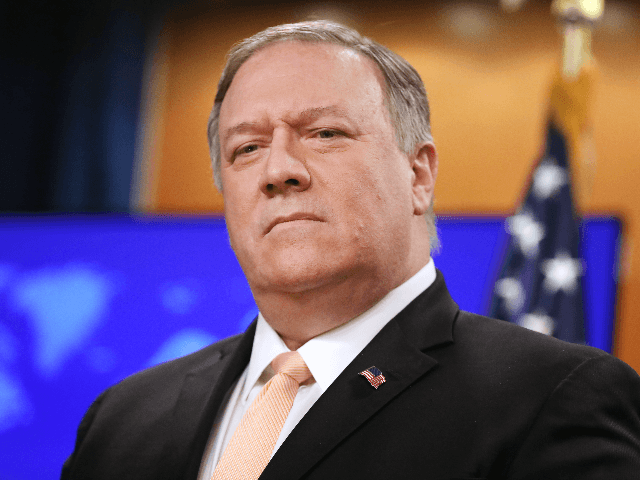The United States formally withdrew from the 1987 Intermediate-Range Nuclear Forces (INF) Treaty on Friday, concluding a six-month advisory period in which Russia failed to correct its repeated violations of the agreement.
“Russia is solely responsible for the treaty’s demise,” said Secretary of State Mike Pompeo, with immediate support from NATO and Poland.
Pompeo’s statement on the withdrawal reviewed Russia’s violations and the Trump administration’s response:
Dating back to at least the mid-2000s, Russia developed, produced, flight tested, and has now fielded multiple battalions of its noncompliant missile. The United States first raised its concerns with Russia in 2013. Russia subsequently and systematically rebuffed six years of U.S. efforts seeking Russia’s return to compliance. With the full support of our NATO Allies, the United States has determined Russia to be in material breach of the treaty, and has subsequently suspended our obligations under the treaty. Over the past six months, the United States provided Russia a final opportunity to correct its noncompliance. As it has for many years, Russia chose to keep its noncompliant missile rather than going back into compliance with its treaty obligations.
The United States will not remain party to a treaty that is deliberately violated by Russia. Russia’s noncompliance under the treaty jeopardizes U.S. supreme interests as Russia’s development and fielding of a treaty-violating missile system represents a direct threat to the United States and our allies and partners. The United States greatly appreciates the steadfast cooperation and resolve NATO allies have shown in responding to Russia’s violation.
Pompeo said the Trump administration wants to replace outmoded and ineffective treaties from the Cold War with multilateral arms control that reflects the strategic realities of the new century.
“President Trump has charged this Administration with beginning a new chapter by seeking a new era of arms control that moves beyond the bilateral treaties of the past. Going forward, the United States calls upon Russia and China to join us in this opportunity to deliver real security results to our nations and the entire world,” he said.
The North Atlantic Treaty Organization (NATO) stood behind the U.S. assessment and announced it would develop non-nuclear methods of deterring Russia from using the weapons it illegally deployed.
“Russia bears sole responsibility for the demise of the treaty,” NATO said on Friday. “NATO will respond in a measured and responsible way to the significant risks posed by the Russian 9M729 missile.”
NATO Secretary-General Jens Stoltenberg added the alliance would not make any “rash moves” or “mirror what Russia does” because it wants to avoid “a new arms race.”
“There are no new NATO missiles in Europe, but there are many, many, many new Russian missiles,” Stoltenberg noted, prompting the New York Times to wonder exactly what he does plan to do about the situation:
While blaming Russia, the United States has cited a threat from China, which was not a signatory to the treaty, as another reason for abandoning the pact. A large percentage of Chinese missiles are of intermediate range, and Washington plans to start testing a new class of intermediate-range missiles this summer that are intended to counter China.
But the abandonment of the pact leaves Europe exposed to Russian land-based missiles capable of hitting their targets within minutes — exactly the vulnerability that led to the treaty in the first place, after the United States started deploying Pershing II missiles in Europe in the early 1980s to counter Soviet SS-20s. The American deployments caused huge public protests in Western Europe and explain why NATO’s 29 countries do not want to go through the experience again.
[…] With the loss of the treaty, “Europe loses a central pillar of its security,” Christian Mölling and Heinrich Brauss of the German Council on Foreign Relations wrote in a recent paper. “Russia’s threat potential rises due to its intermediate-range missiles,” which “could split NATO into two zones of security and lead Moscow to assume it holds escalation dominance.”
Russia’s new missiles are land-based, mobile, difficult to identify, rapidly employable and armed with conventional or nuclear warheads, and can strike almost any target in most European countries with little to no warning time, Mr. Mölling and Mr. Brauss wrote.
NATO members on Friday urged Russia to help preserve other arms-control agreements and joined the Trump administration in stressing that China must become a party to new multilateral agreements. China generally scoffs at such demands, claiming its nuclear arsenal is too small for anyone to worry about and its weapons are purely “defensive” in nature.
“Russia’s lack of readiness to return to compliance with the INF did not leave the United States any choice,” the foreign ministry of Poland said on Friday. Poland has long supported U.S. withdrawal from the INF treaty and said it would welcome defensive American weapons on its soil to counter the Russian threat.
The 9M729 missile is a banned weapon the Russians began testing early in the Obama administration. Former President Barack Obama decided not to confront the Russians over the violation, instead opting for quiet back-channel discussions to persuade Russia to resume compliance with the INF Treaty, which prohibited the deployment of surface-to-surface missiles with certain capabilities so eastern Europe would not become festooned with missile launchers. The Obama approach proved entirely ineffective.
White House officials noted on Friday that Russia lied about its violations of the INF treaty throughout the Obama administration, but then “finally when confronted with the evidence, came clean for this in the past several months.”

COMMENTS
Please let us know if you're having issues with commenting.